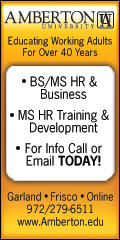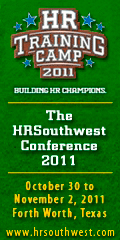
| Archives/Subscribe | Advertise | HR Matters | www.texasshrm.org |
Educational Resources to Consider to Further Your HR Career • Major newspapers and periodicals. HR professionals can expand their knowledge base by reading national and local news. Major daily periodicals provide current information on important law changes, proposed legislation in your state, as well as issues facing local/regional employers - for example, business shutdowns - that may in turn have an effect on your own organization. Keeping on top of these issues can help you create contingency plans for your organization, as well as give you a head start on whether to make changes to current corporate policies. Consider subscribing to one or two major newspapers/periodicals or, as an alternative, dust off that library card and check out the local library. • SHRM website. This site provides a wealth of valuable HR resources for HR professionals. Consider taking a few minutes every day to scan the Latest News section for current new items on the HR front. Also, the Templates and Tools area of the website includes HR Q&As on frequently asked HR questions and How To Guides that not only educate but also provide useful and practical information relevant to HR professional’s responsibilities on the job. • Federal and state government websites. Many federal government websites (DOL, IRS, CMS, Treasury) as well as your state’s department of labor have sections on frequently asked questions, which HR professionals can use to educate themselves on federal and state laws and practices. • Books on HR topics. The SHRMStore is the world’s largest HR bookstore and provides numerous learning products in a variety of formats (books, videos, software) on everything under the HR sun. • Formal education and certification programs. Consider pursuing an advanced degree, certificate program or professional certification in human resources. Most major universities provide advanced degrees and certificates in the HR field. The HR Certification Institute provides testing to gain certification as a Professional in Human Resources (PHR®), Senior Professional in Human Resources (SPHR®), Global Professional in Human Resources (GPHR®) or California certification (PHR-CA® and SPHR-CA®). These certifications show your peers, your employees and your organization that you have mastered the core HR principles. Certification also requires continuous learning, which can motivate HR professionals to seek out continuing educational opportunities. • Courses/seminars. SHRM and other providers offer HR-related courses and seminars on various HR topics, including information and guidance on new laws, their effect on employers and successful integration/implementation of new policies and practices to ensure legal compliance. SHRM also offers e-learning courses that provide education on HR-related issues. • Local SHRM chapters. Local chapters are an excellent resource for networking with other HR professionals about the issues they face every day, as well as providing vendor recommendations and best practices to further expand HR knowledge/expertise. • Volunteering. Volunteering in a professional capacity with local community groups or sitting on the board of another local organization can help build business expertise and hone leadership skills. • Mentoring. Consider setting up a mentoring plan with another senior manager within your organization. This cannot only provide insight on other management styles/roles, but also broaden business knowledge in other areas of an organization. For example, working with a senior financial manager can provide knowledge on corporate financial practices that may be helpful in a future position. While not an exhaustive list, these suggestions should provide you with ideas on ways to continue learning and contributing to the HR profession. |
P.O. Box 8058
Tyler, Texas 75711
www.texasshrm.org • info@texassshrm.org • 214-354-8740


